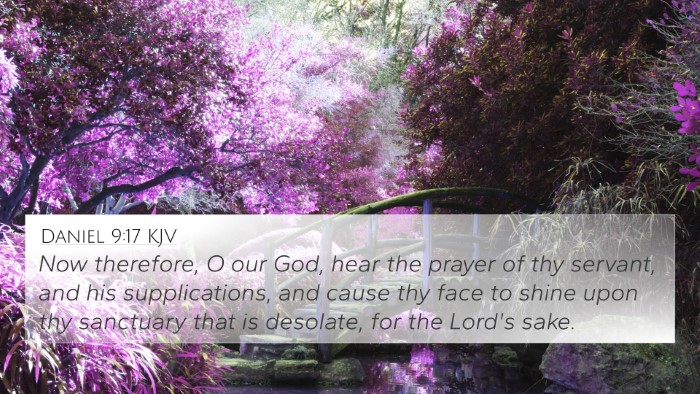Psalms 25:16 - Summary and Explanation
Psalms 25:16 states: "Turn thee unto me, and have mercy upon me; for I am desolate and afflicted." This verse reflects a deep plea from the psalmist, expressing a desperate need for divine attention and compassion during times of trouble. It serves as a poignant reminder of the human condition and our reliance on God's mercy in moments of despair.
Meaning and Insights
The psalmist calls upon God to turn towards him, indicating a sense of isolation and need. This verse resonates with the themes of suffering and restoration present throughout scripture.
-
Matthew Henry's Commentary:
Matthew Henry emphasizes the urgency in the psalmist's plea, highlighting the significance of God's gaze. In moments of loneliness and affliction, the psalmist seeks the comfort that comes from knowing God is attentive to his plight. The language reflects a heartfelt supplication for mercy and recognition.
-
Albert Barnes' Notes:
Albert Barnes notes the emotional turmoil and desolation felt by the psalmist. The request for God to "turn" indicates a desire for a divine intervention. Barnes maps this psalmist’s experience as relatable to anyone facing tribulation, emphasizing the need for God’s mercy in tough times.
-
Adam Clarke's Commentary:
Adam Clarke interprets the phrase "desolate and afflicted" not only as physical suffering but also spiritual distress. Clarke underscores that the plea signifies acknowledgment of one's helplessness and the necessity of divine grace.
Cross Reference Insights
This verse can be cross-referenced with several other Scriptures, providing a deeper understanding of the themes of mercy and divine attention. Here are seven related Bible cross-references:
- Psalms 34:18 - "The Lord is nigh unto them that are of a broken heart; and saveth such as be of a contrite spirit." This parallels the psalmist's plea for God’s nearness in affliction.
- Psalms 102:1-2 - "Hear my prayer, O Lord, and let my cry come unto Thee. Hide not Thy face from me in the day when I am in trouble." This reflects the desire for God’s attention during difficult times.
- Isaiah 41:10 - "Fear thou not; for I am with thee: be not dismayed; for I am thy God: I will strengthen thee; yea, I will help thee." This verse complements the notion of divine assurance in moments of despair.
- James 4:6 - "But He giveth more grace. Wherefore He saith, God resisteth the proud, but giveth grace unto the humble." This relates to the humility expressed in the plea for mercy.
- Matthew 11:28 - "Come unto me, all ye that labour and are heavy laden, and I will give you rest." This invitation echoes the longing for relief from burdens.
- Psalms 6:2 - "Have mercy upon me, O Lord; for I am weak: O Lord, heal me; for my bones are vexed." This demonstrates a similar cry for mercy amidst suffering.
- 2 Corinthians 1:3-4 - "Blessed be God, even the Father of our Lord Jesus Christ, the Father of mercies, and the God of all comfort; Who comforteth us in all our tribulation." This New Testament context reinforces the theme of divine mercy and comfort.
Thematic Connections and Analysis
When analyzing Psalms 25:16 through the lens of cross-referencing, we uncover the rich tapestry of themes that appear throughout the Bible. The interconnectedness seen here illustrates the broader biblical narrative regarding suffering, mercy, and God’s attentiveness to His people.
The collective insights from these scriptures emphasize not only the individual psalmist’s plight but also the universal experience of seeking God during difficult times. The themes suggest God’s posture of mercy and readiness to respond to those who acknowledge their need for His help.
Conclusion
Psalms 25:16 encourages believers to turn to God in humility, highlighting the importance of seeking divine mercy in our times of desolation. By engaging in cross-referencing, we are equipped with tools for Bible cross-referencing and can better understand the comprehensive nature of God’s promises throughout scripture.
In studying such connections, we develop a deeper appreciation for the scriptural cross-referencing that enriches our faith journey. The Bible invites us to examine these themes closely, fostering an enriching dialogue between the Old and New Testament teachings and revealing the unwavering nature of God's mercy.










